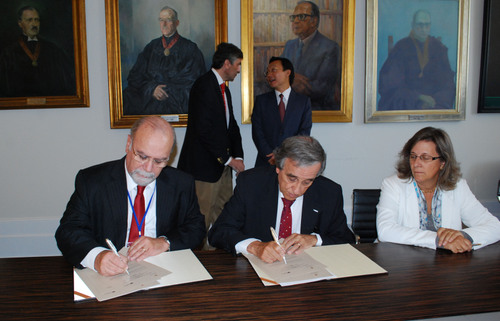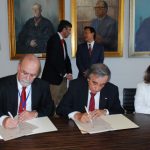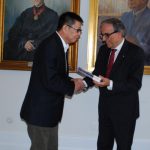 UM signs an agreement with the University of Porto on student exchange
UM signs an agreement with the University of Porto on student exchange
The University of Macau (UM) Faculty of Arts and Humanities on 22 September signed a collaboration agreement with the University of Porto (UP) Faculty of Arts on the exchange of undergraduate students.
The agreement was signed in Portugal by Prof Rui Martins, vice rector (research) of UM and representative of UM’s rector; Prof Sebastião Feyo de Azevedo, rector of UP; and Prof Fernanda Ribeiro, dean of UP’s Faculty of Arts. The ceremony was witnessed by Tam Chon Weng, secretary for social affairs and culture of the Macao SAR; and Dr. António Coelho, secretary-general of the Ministry of Science, Technology, and Higher Education of Portugal.
According to the agreement, the two universities will enter a formal stage of promoting student exchange. Eligible students are those recommended by their respective universities, including third- and fourth-year undergraduate students from UP’s Faculty of Arts, as well as third-and fourth-year undergraduate students from UM’s Faculty of Arts and Humanities.
So far, UM has signed collaboration agreements on student exchange with six Portuguese-speaking universities, namely the University of Evora, the University of Minho, the University of Coimbra, and the University of Porto in Portugal; the Federal University of Minas Gerais in Brazil; and the Universidade Politecnica in Mozambique.
During the ceremony, Prof Yao Jingming, head of UM’s Department of Portuguese, presented two copies of his book, which is a collection of his Chinese translations of poems by Eugénio de Andrade, to Prof Sebastião Feyo de Azevedo. The recipient of an honorary doctorate from UP, Eugénio de Andrade is one of the cultural icons in Porto.
View gallery


